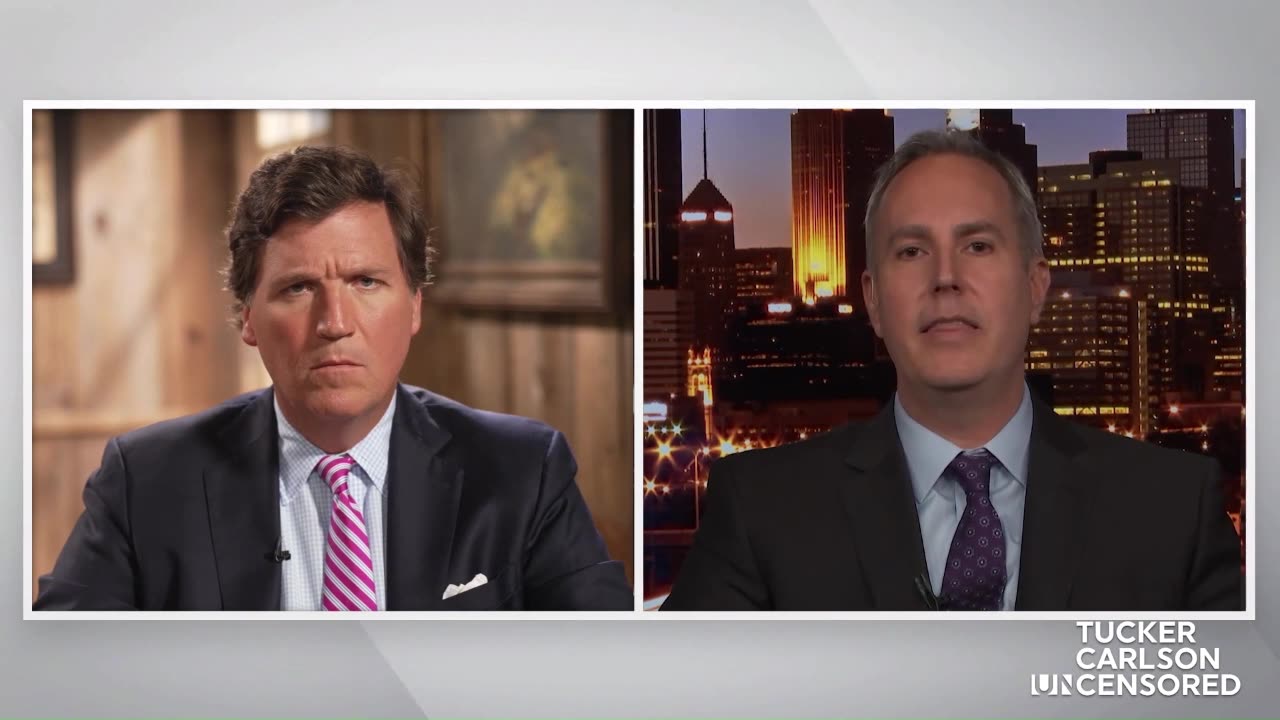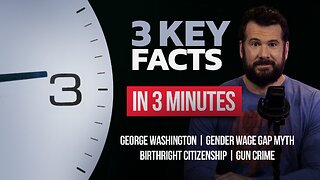Premium Only Content

TUCKER Uncensored: The Derek Chauvin Stabbing
The Derek Chauvin Stabbing
Published Dec 28, 2023
•
14 mins
EPISODE DETAILS
Derek Chauvin is serving 21 years in prison for a crime he didn't commit. Someone just tried to murder him. If they'd do this to him, they'd do it to you.
READ THE TRANSCRIPT
Tucker [00:00:00] One of the great moral atrocities in the last several years was taking place right before us, and very few were remarking upon it. And it happened to a Derek Chauvin. He's the Minneapolis cop who became famous Memorial Day 2020 when George Floyd died. Chauvin is now serving 21 years in federal prison for murder, for killing George Floyd. The problem is he did not murder George Floyd. And we know that conclusively because the medical examiner who performed the autopsy on George Floyd confirmed he was not asphyxiated, he was not choked to death. He most likely died of a drug O.D. He had fatal levels of fentanyl in his system. And that's been known for some time, though again, ignored. Ignored to the extent that well Derek Chauvin was convicted of murder and sent to prison. And then on November 24th of this year, right after Thanksgiving, Chauvin was stabbed 22 times by another inmate with an improvised knife. Now, the man who stabbed him is a known FBI informant. Derek Chauvin is now out of the hospital and back in Tucson. He is alive. He's still in prison. Gregory Erickson is his lawyer and joins us now to discuss this case. Mr. Erickson, thank you so much for coming on.
Gregory Erickson [00:01:06] Thank you. Thank you for having us on.
Tucker [00:01:08] First of all, how is your client and if you don't mind - news reports haven't said very much about what exactly happened, would you tell us what you know?
Tucker [00:02:09] May I interrupt you? Is a prison allowed to prevent an inmate in the middle of an appeals process from speaking to his lawyers? I didn't know that was legal.
Gregory Erickson [00:02:17] No, and they're not they're not allowed to keep him. But they didn't keep him from my partner during the appeal process. It was really only after the stabbing that basically the family and the lawyers were shut out for a period of over 48 hours. And so what we know is from Derek reporting to his family members about what happened. Basically he was in the law library and how he was allowed to be in the law library with other prisoners. I don't know. I'm not familiar with the inner workings of federal prison. But I would think that somebody as high profile as Derek probably shouldn't be allowed to be in there unsupervised. But he was in there supposedly unsupervised, and another inmate with an improvised knife attacked him from behind and stabbed him 22 times.
Tucker [00:03:15] I think it's a little confusing to Americans who still think our justice system is fair or works at all, to know that it's been shown, I would say, conclusively by the medical examiner that George Floyd was not murdered. And yet your client is still in prison for murdering him. How did this happen?
Gregory Erickson [00:03:39] You need to understand, Tucker, we are constitutional specialists, and that's why we were selected to do this appeal. We are not day to day criminal trial attorneys. So how it happened. Well, I can tell you how it happened. First of all, when the judge denied the motion to change venue, it basically conducted the trial in an area where everyone who was on that jury was afraid for their safety. Yes. When you make... The National Guard was not there to protect the jurors if they made a guilty verdict. They were there to protect the jurors. If they made a not guilty verdict.
Tucker [00:04:29] I'm assuming the point was... This was at the moment when the people in charge were telling us the problem with America was white cops because they're white, not racist or anything. And your client was a white cop so that's kind of the point.
Gregory Erickson [00:04:44] And that's why when the medical examiner comes and has an initial autopsy report of a drug overdose, because his lungs were literally filled with fluid, which is a a sign of a fentanyl overdose.
Tucker [00:05:02] Yes. It's why your mind can't breathe. Yes.
Gregory Erickson [00:05:05] But mind you, George Floyd had previously overdosed in police custody, I think, 6 to 8 months earlier. So he had ended up in the hospital. So the medical examiner labels it a drug overdose. And then mystically, after meeting with Mike Freeman and the Attorney General for 2 hours, mystically, somehow the medical report changes. You can, you know come to whatever conclusions you want to come to.
Gregory Erickson [00:06:13] I think everybody wants the case to go away.
Gregory Erickson [00:06:29] I think he's being sacrificed for an idea. And damn the facts. Damn the facts. Damn the evidence of overdose. Damn the fact that he was using a technique in the police manual. Let's publicize the civil settlement when we didn't have to. How could the jury come out any other way?
Tucker [00:06:59] Would you say, though, that this does deserve a forensic examination? Like how did this how did this happen? I mean, the guy who did the autopsy said he didn't he wasn't asphyxiated. So let's just start there. The whole thing's a lie. So don't you think it's worth knowing exactly how and why these lies were told so this won't happen in the future to say you or me or someone else?
Gregory Erickson [00:07:20] 100%. But do you think anybody in Minnesota is going to order that? No.
Tucker [00:07:29] So you're saying that the governor of Minnesota is just kind of totally fine with this?
Gregory Erickson [00:07:35] Of course he is.
Tucker [00:07:36] You had to have expected that. Of course. I mean, you were required there for at least a year or two to believe that George Floyd, St George Floyd was murdered. The Episcopal Church, actually, I think, made him a saint, of course. So to take the case of the guy who was wrongfully convicted for his murder, you must have thought about that and thought, well, you know, I'm going to get some blowback for this. Why did you do it anyway?
Gregory Erickson [00:07:58] Well, that's one of the things that we do. We're the only people that you can come to when you are the quote unquote, bad guy, you know, in regards to the establishment. And so, you know, that's why we do election integrity work. That's why we do, you know, anti DEI stuff to allow parents to have rights as to what their children are taught. We're doing that with the Michigan school systems right now. So we do the types of cases that basically if you're in a large law firm, you can't possibly take because all the big clients, they're always dealing hand in hand with the government. They can't take them. And so our little ten person operation in downtown Minneapolis just is flooded with calls for help from thousands of people that are, you know, being victimized in one way or another. And the sad thing is that we're not independently wealthy, so we we have to only take the cases that can pay us for the most part. We took this particular case with no promise of payment whatsoever because all the police unions funds were exhausted in the trial. We took it because the state of Minnesota disallowed a public defender for Derek. And then at that point, even though we all had bills to pay, we're all just like, come on.
Tucker [00:09:39] Wait. I'm sorry I missed that detail. He's the one person in America who is not entitled to counsel? What?
Gregory Erickson [00:09:49] We initially turned it down, okay? Then the state of Minnesota denied him a public defender. And we're like, come on, okay, we got to do something here.
Tucker [00:10:01] So how are you paying? And bless you for doing that. How are you paying me? Who's paying for this?
Gregory Erickson [00:10:06] Well, Mrs. Chauvin started Give Send Go legal defense fund for Derek. Obviously because he's already convicted, there hasn't been a lot of money. This is an extremely expensive process doing all these appeals and just even the transcript... A writ of certiorari to the United States Supreme Court is literally a published book. So you have a bound book and it costs, I don't know, $7,000 - $10,000 with the record to do. So I mean, there are significant costs involved. Mrs. Chauvin and started a Give Send Go site and some decent people have raised about $100,000. But because of the nature of this case and the voluminous record and things of that nature, you know, obviously we're we're probably $200,000 into the hole. And, you know, we're going negative. So all of these people that are calling us greedy lawyers for representing Chauvin, it's just like, whoa, really? We're $200,000 in the negative just because we thought that it was the right thing to do.
Tucker [00:11:21] What what's the next step and what are the chances? I mean, it's just again, I want to say it's horrifying to think that an innocent man is sitting in prison being stabbed. So what are the chances he gets out and how would that happen if it does?
Tucker [00:12:24] Let me ask you one last question. Since you live in Minneapolis, the promise of the aftermath of Floyd's death and the rioting that took place was it will improve the city. And once we taught those white cops a lesson, Minneapolis would be a better place. Is it a better place?
Gregory Erickson [00:12:42] No, no. We office downtown. It's far worse. I will say this and, you know, COVID had a lot to do with that, too, because people work from home and a lot of people didn't want to come back in the office. But downtown Minneapolis is just starting to come back to life. But to be honest with you, it was a ghost town post COVID, post George Floyd for years, and it's just now starting to come back slightly, but it's nowhere near what it was before. It certainly has not improved.
Tucker [00:13:22] So George Floyd's family is rich, but everyone else is worse off, it sounds like.
Gregory Erickson [00:13:26] That's a fair statement.
Tucker [00:13:29] Gregory Erickson, the lawyer for Derek Chauvin, joining us. Thank you very much.
Gregory Erickson [00:13:33] Thank you.
-
 1:28:04
1:28:04
Russell Brand
2 hours agoBREAKING: UK Troops To Ukraine | Zelensky Wants “Army Of Europe” | JD Vance SLAMS EU Tyranny – SF538
92.4K34 -
 1:46:20
1:46:20
Benny Johnson
4 hours agoPANIC: Feds FLEE DC After Mass PURGE, Fired USAID Activists EXPOSED | Trump DOMINATES Daytona 500
96.5K74 -
 1:58:43
1:58:43
The Charlie Kirk Show
2 hours agoCBS Steps In It + Hockey Brawl + Judicial Standoff | Yoo, Schlapp, BigTree | 2.17.2025
85.3K14 -
 1:01:26
1:01:26
The Dan Bongino Show
5 hours agoTrump Is Cancelling DEI And Cancel Culture (Ep. 2424) - 02/17/2025
690K1.35K -
 1:06:12
1:06:12
Timcast
4 hours agoDemocrat Swamp IMPLODES, CBS Runs DAMAGE Control For Democrats, Gets ROASTED By Elon | Timcast LIVE
127K125 -
 2:00:58
2:00:58
RealAmericasVoice
11 hours agoWAR ROOM WITH STEVE BANNON AM EDITION
104K18 -
 2:59:47
2:59:47
Wendy Bell Radio
9 hours agoAmerica Drops The Gloves
105K56 -
 1:22:27
1:22:27
Steven Crowder
5 hours agoGeorge Washington, Our First President | 3 in 3 Special
296K175 -
 1:03:57
1:03:57
Kyle Fortch
5 hours ago $1.44 earnedDJ Chill: DJing For Jelly Roll, SOLD OUT Tour, Performing at Hometown Arena | THE ONE SHEET S1E4
47.5K3 -
![The Deep State Spied On Trump & Sabotaged 2020 Operation To Oust Maduro [EP 4440-8AM]](https://1a-1791.com/video/fwe1/94/s8/1/F/5/k/Z/F5kZx.0kob-small-The-Deep-State-Spied-On-Tru.jpg) 4:05:26
4:05:26
The Pete Santilli Show
16 hours agoThe Deep State Spied On Trump & Sabotaged 2020 Operation To Oust Maduro [EP 4440-8AM]
66.9K3